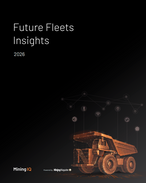This article is 4 years old. Images might not display.
The demotion of Pitt follows last week's leadership spill in the Nationals that led to Barnaby Joyce replacing Michael McCormack as deputy prime minister.
Pitt will retain the resources portfolio, and water, however, he will no longer sit at the table where major policy decisions are made.
Minerals Council of Australia chief executive Tania Constable said she "noted the Cabinet reshuffle" at a time when mining export revenue was at an all-time high underscoring the importance of the sector to the nation.
"The industry will work with all government ministers, recognising the substantial contribution mining makes across many areas of the economy and society including as the largest sector contributor to the nation's gross domestic product, and looks forward to the return of resources to Cabinet," she said.
Dumping Pitt from cabinet shocked industry but also drew the ire from the Labor opposition, which said while Pitt was "far from a stellar resources minister" at least he had a direct line to cabinet until now.
Labor resources spokeswoman Madeline King told Australia's Mining Monthly said the decision was a "slap in the face" to mining and resources communities.
"After knifing Michael McCormack last week, Barnaby Joyce declared he would have a "laser-like focus" on the needs of resources communities," she said.
"It seems that focus only lasted a few days."
Losing Pitt from cabinet at a time when the resources industry is vital to continued investment and growth could have a negative impact on the Australian economy.
It could be argued that the voices of industry will find it harder to penetrate cabinet to spur ideas for growth.
The Queensland Resources Council said moving resources to the outer ministry was surprising and Pitt had been doing "an outstanding job."
"The Queensland Resources Council believes the resources industry, as Australia's number one export industry, should be a cabinet portfolio," QRC chief Ian Macfarlane said.
Macfarlane is widely considered to have been one of Australia's most effective resources ministers.
One key reason behind the spill that led to McCormack being dropped as Nationals leader and deputy prime minister, was party concerns about committing to net-zero carbon emissions by 2050.
This was not lost on King, who said the mining and energy sector would be "central in Australia achieving net zero emissions by 2050".
Pitt's demotion comes as government forecasts revealed resources and energy exports are expected to hit a record $310 billion for the 2020-21 financial year. This is a 7% increase on the previous year, on the back of strong iron ore demand, base metals and critical minerals for the energy transition.
In fact, according to the Department of Industry, Science, Energy and Resources' latest Resources and Energy Quarterly report, the value exports of Australian mined product grow over the next financial year, to an estimated $334 billion.
Record iron ore prices are providing a much-needed surge in government revenue, while metallurgical coal exports are flying high with as customer countries look to ramp up steel production.
Iron ore, gold and copper export revenue is forecast to be a record $149 billion, $28 billion and $12 billion respectively.
Metallurgical coal export revenue is forecast to be $22 billion, thermal coal $17 billion, and aluminium, including bauxite, alumina and refined metal, $12 billion.
"These incredible results underline the importance of Australia's resources sector to the national economy and international markets throughout the COVID-19 downturn," Pitt noted.
"The [mining] sector is poised to take advantage of the global post-COVID recovery and capture opportunities from strong demand and higher prices across a range commodities."
























